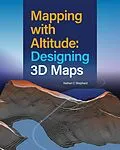Explore and master another dimension.
Spatial information that is inherently 3D, such as buildings, topography, and subsurface geology, should be displayed in a way that is both intuitive and measurable-in three dimensions! Representing data in 3D lets you investigate complex spatial relationships in new ways, identifying patterns and potential problems more effectively.
Mapping with Altitude: Designing 3D Maps helps you deliver clear, compelling cartographic representations in 3D that are both eye-catching and informative. Learn 3D concepts such as surfaces, base heights, texturing, and lighting model. Discover new twists on well-defined 2D cartographic principles, such as size, color, and text. Understand how the z-dimension can convey time. Then choose the best delivery mechanism for your 3D content.
Mapping with Altitude focuses on the decisions you'll make and the specific techniques you can use as you delve into the world of 3D map authoring.
Autorentext
Originally from Australia, Nathan C Shephard currently works at Esri headquarters in Redlands, California where he leads a team of software engineers working on projects such 3D navigation, 3D symbology, and the authoring of animation videos. He acts as a 3D evangelist whenever he can, including presenting an annual "3D Cartography" technical workshop in San Diego. In his free time he writes fiction, designs mobile apps, and spends time with his wife and two daughters.
Inhalt
Why 3D?
Anatomy of a 3D scene
Authoring for specific scales
Delivery format
Using surfaces
Displaying draped content
Displaying features: Geometry types, base-heights, and anchor points
Displaying features: Shape, rotation, and scaling
Displaying features: Textures and materials
Displaying features: Animated symbols
Displaying text and labels
Temporal content in 3D
Configuring the scene
Exploring the scene
3D cartography call to action
